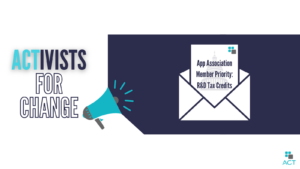
Earlier this year, we highlighted the pivotal role that research and development (R&D) plays in expanding the app economy and outlined how an aspect of the 2017 Tax Cuts and Jobs Act severely challenged entrepreneurs’ ability to immediately deduct full R&D expenses. Instead, business owners are now required to amortize these expenses over a five year period. The consequences this change in the law has for business operations produced an urgent need to provide relief through the repeal of the amortization provision of Internal Revenue Code (IRC) Section 174.
The federal tax code plays an important role in providing the right incentives for American small businesses to compete and grow in the app economy. Rewarding best practices through tax incentives, like R&D deductions, empowers small companies to offer competitive benefits and leads to technological solutions. Sadly, the lapse of this critical provision will result in the loss of well-paying American jobs and will diminish the competitive advantage of the small to medium-sized businesses driving the global app economy.
As Congress approaches end-of-year funding negotiations, our members came together to send a letter outlining their top priorities for Section 174 relief. Below, we’ve highlighted some of their insights, priorities, and points of view, as well as a copy of the letter describing how Congress can work together to empower the app economy’s brightest, most agile developers.
“In a more globally competitive world, the United States must support small business-driven innovation, domestically. America has always led the world in innovation, but this proposed removal of the R&D tax credit does not support our continued global leadership in innovation, in fact, it inhibits it. Small business innovation creates jobs, transforms our technological capabilities, and improves the quality of life for millions of Americans. Avenue Health operates in a particularly challenging healthcare environment, and we need every bit of help we can get to bring lifesaving, cost-effective, and transformative clinical programs to our nation’s Medicare patients.”—Robert Longyear, Founder and CEO, Avenue Health
“In FY22, our tax bill increased by four times because we could not fully expense engineering salaries. We cannot afford this in 2024… Small companies are the engines of innovation. Many, many, many software companies will not survive. It will take a decade to recover, assuming there is an incentive to ever start a software company again.”—Edwin Schmierer, Co-Founder and COO, Rotational Labs
“As a result of the changes in how early-stage startup expenses are able to be expensed, we had to make hard decisions about what to cut from our budget when we were still just getting our feet under us.”—Tom Rohlf, Co-Founder and CEO, Junglytics
“Reviving the R&D tax credit is vital for small business innovation and U.S. competitiveness. Every day that goes by without a solution leaves American businesses further and further behind.”—Marc Fischer, Founder and CEO, Dogtown Media
Next Steps
Section 174 is more than a tax provision; it is a lever for companies to invest, hire, and grow. In an ever intensifying race for R&D funding, we must support the vital ecosystem of our nimble and dynamic small business innovators. The absence of R&D tax relief casts a shadow of uncertainty over not only their ability to grow, but also their future survival.
We urge Congress to repeal the amortization provision under Section 174, so businesses can continue innovating, creating jobs, and redefining the way we live, work, and play.
To learn more information about the App Association’s advocacy on tax regulation or our other priorities, please contact our Membership and Program Manager, Brad Simonich: [email protected]